Original Title: "The Mystery of the Fall of Polymarket's 'God of Sports Prediction' After Earning $4 Million and Losing All Assets"
Original: Odaily Planet Daily
Author: Wenser
Polymarket's prediction game has always been a feast for a few and a gamble for the many. Similar to the contract market, it is filled with "black swan reversals," especially in sports upsets.
Today, we will discuss the fall of a trader once hailed as the "God of Sports Prediction"—Mayuravarma. This trader, whose ID carries the Indian caste style of "prediction veteran," managed to violently increase his initial capital of $5,000 to $3.8 million in just one month, achieving a profit of 760 times and briefly ranking sixth on the sports profit leaderboard. However, as is often the case with peaks, within just a week, his assets were nearly wiped out.
Mayuravarma's experience once again confirms that the so-called "tail-end betting strategy" on Polymarket is unreliable. Betting events like sports matches often have dramatic reversals at the last moment—you are not just betting on that bit of "certain profit," but rather your entire capital.
Next, let us review the collapse of this prediction myth.
The Rebirth of an Indian Noble as the "God of Sports Prediction": A Journey in the Prediction Market Starting from LOL Matches
Mayuravarma began his journey in the prediction market with the LOL World Championship. According to his profile information, he placed a total of 9 bets during the LOL S15 World Championship, resulting in 6 wins and 3 losses, with a win rate of about 67%. Ultimately, his betting on LOL matches resulted in a cumulative loss of about $20,000, with a profit of about $790,000, including:
- Betting $150,000 on the AL vs. T1 match, winning $162,500;
- Betting $1.1 million on the KT vs. T1 finals, ultimately winning nearly $600,000.
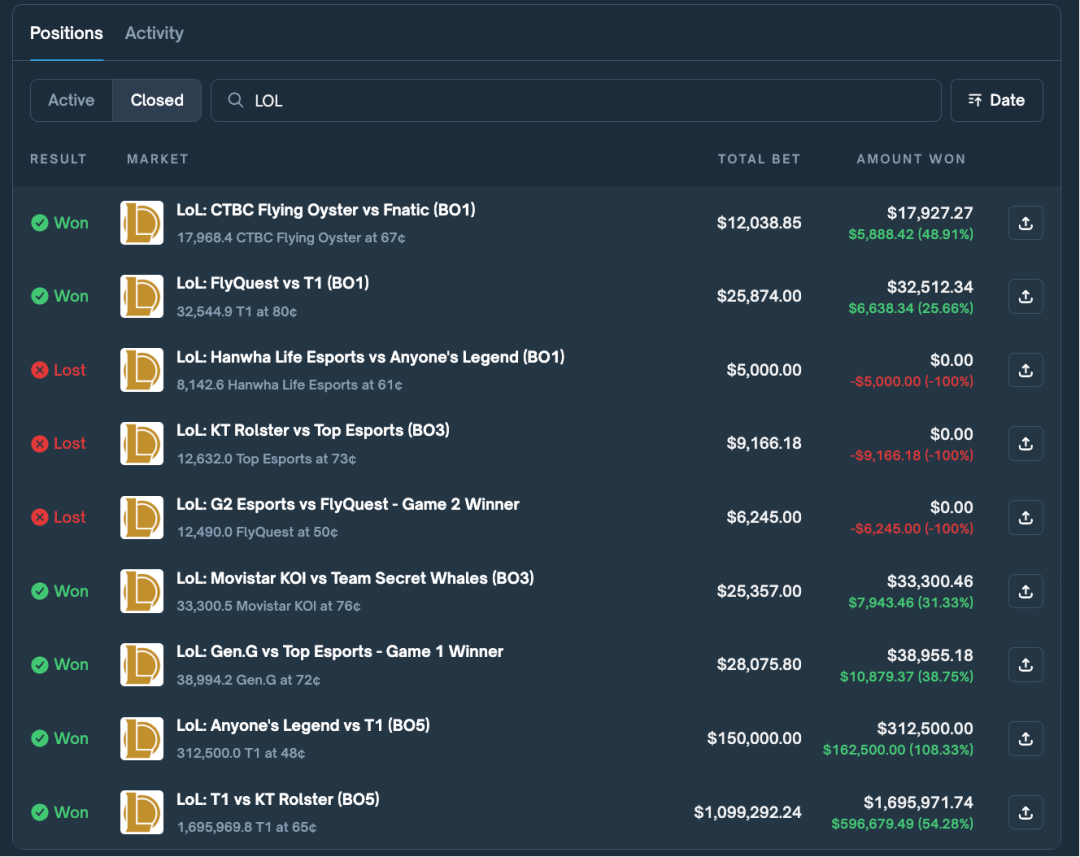
Personal Information Homepage
From eSports to American Professional Sports Leagues: Mayuravarma's Path to Glory
With the help of the annual world-class eSports event, Mayuravarma successfully earned about $770,000 in net profit. After briefly betting on 3 LOL matches, he began his "path to becoming a god of sports event prediction," expanding his betting field from LOL eSports to famous American professional leagues and various sports events—CFB (College Football), NHL (National Hockey League), NBA (National Basketball Association), and NFL (National Football League), among others.
Initially, Mayuravarma's betting could be described as "winning every bet": in 5 CFB events and 2 NHL matches, he achieved a return rate of about 30% to 82% through multiple bets, with one instance yielding a profit of up to $360,000.
Here, we can also see Mayuravarma's betting style: he preferred pre-game betting, with amounts ranging from thousands to hundreds of thousands of dollars, and rarely sold during the game. This not only allowed him to gradually roll over small funds into large results in the early stages but also set the stage for his later ALL IN attempt to turn the tide in an NHL match, which ultimately backfired.

After starting to bet on NFL matches, his win rate suddenly dropped: in 5 NFL matches, his win rate fell from a previous 100% in CFB betting to around 40%.
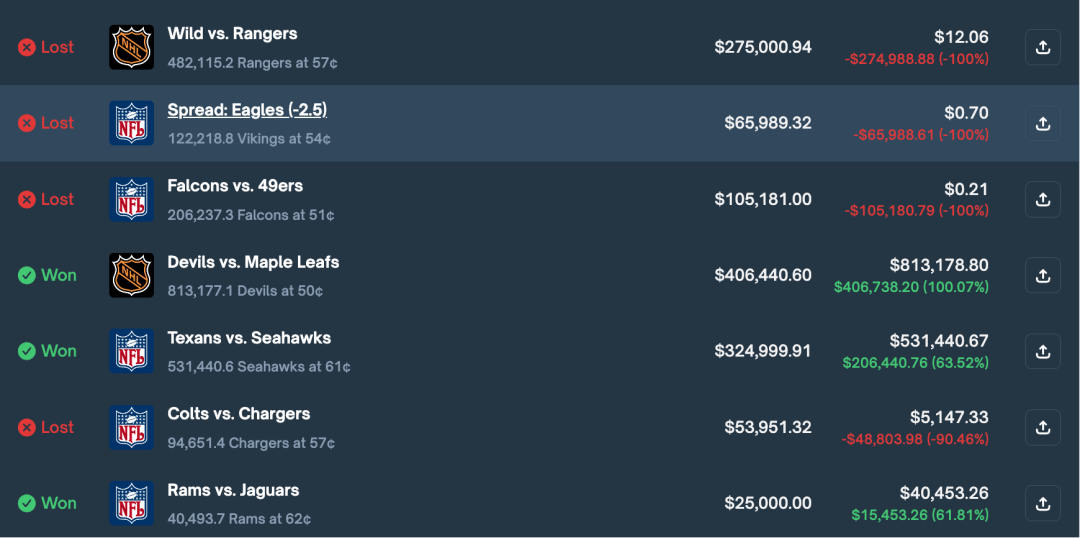
There are also two dramatic details worth elaborating on:
First, in an early NHL match between the Wild and Rangers, Mayuravarma bet on the Rangers to win at odds of 57:43, ultimately losing $275,000 in betting funds; in a subsequent NHL match, he again bet on the Wild's opponent, the Devils, due to their higher win rate, profiting $86,000 from a bet of less than $120,000, illustrating the randomness of the prediction market.
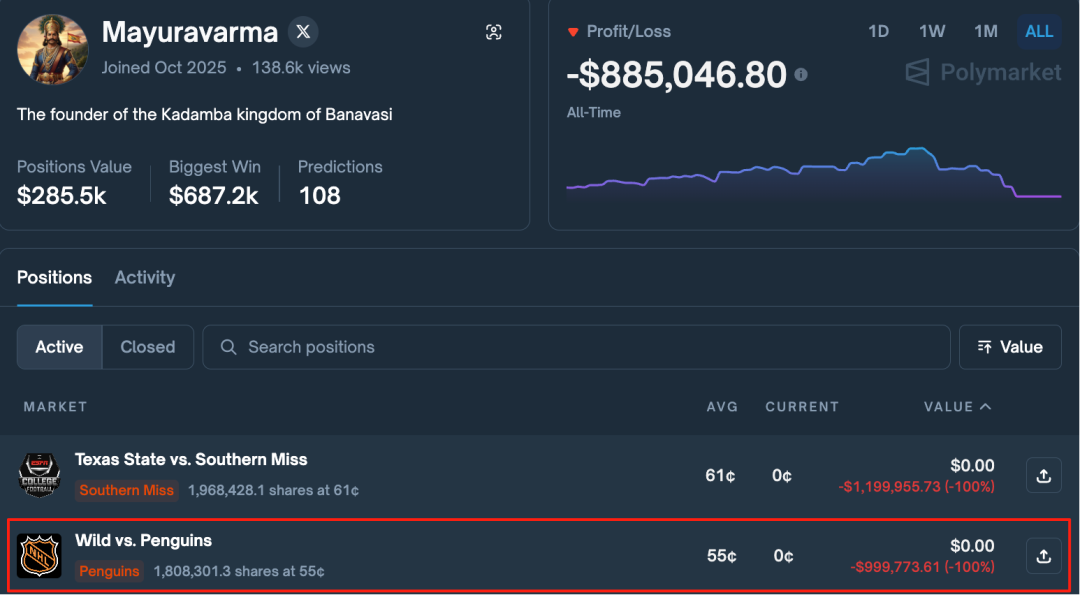
Second, in the NHL match on November 22 between the Wild and Penguins, he invested $1 million betting on the Penguins to win, only for the Wild to unexpectedly defeat the Penguins 5-0, resulting in a loss of his $1 million betting funds.
Subsequently, Mayuravarma began betting on NBA events, successfully predicting the Warriors to defeat the Lakers in 2 matches, with a single match profit of nearly $100,000, maintaining a temporary win rate of 50%.

The results of subsequent betting events seemed somewhat mundane, but the process was smooth for Mayuravarma. He maintained a high win rate across LOL, NHL, and NBA matches, and from these betting interfaces, we can also see another aspect of his betting style: he preferred to bet on teams with higher pre-game win probabilities and stronger capabilities, rather than hoping for upsets. This reflects Mayuravarma's deep attention and understanding of various sports events, providing a certain guarantee for his continued profitability, but it also left room for potential upsets.
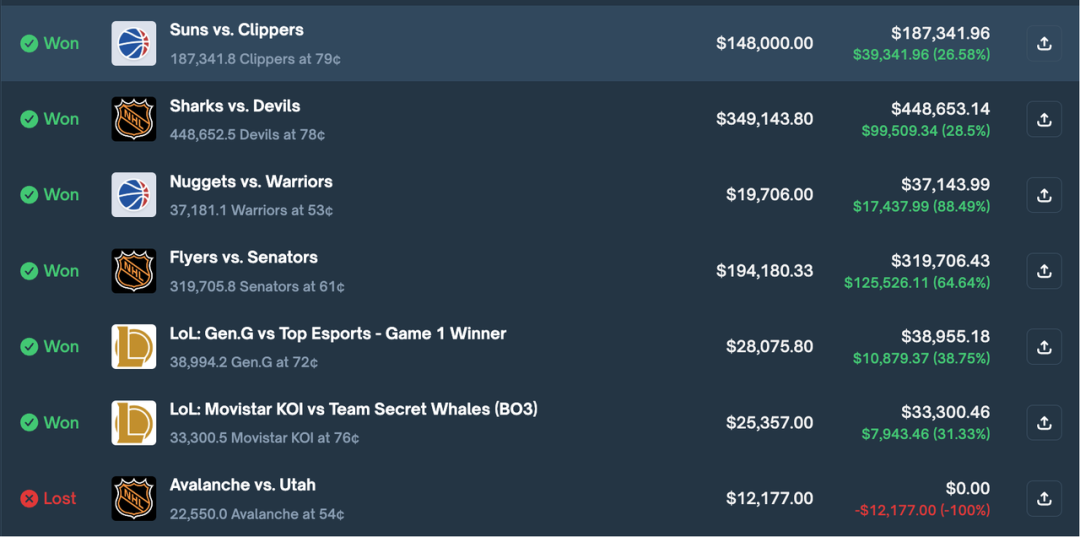
After all, as the saying goes in football and various sports events: "Football is round, anything can happen." It could be an own goal, a heroic solo effort, or an unintentional mistake by the referee. In short, sports events contain infinite possibilities, and every unexpected outcome is a gamble where the bettor stakes their real money.
The Potential Impact of the Prediction Market: When Money Becomes a Paper Number
With each betting event, Mayuravarma's betting amounts continued to increase, starting from $2,000, gradually rising to $30,000 to $50,000, and later, he would casually place bets of $100,000. In less than a month, he transformed from a "newbie in the prediction market" to a "betting whale" in the eyes of Polymarket players.
From the following settlement records, it can be seen that during this phase, Mayuravarma was in a "normal distribution range":
- In 24 events, his win rate remained at 50%, with 12 successful bets and the rest failing;
- In the 12 failed bets, he invested a total of about $840,000, losing it all;
- In the 12 winning bets, he accumulated a profit of about $1.64 million, with a profit-loss ratio close to 2, meaning his profit was about 1.95 times his losses;
- The two largest losses came from NBA matches, with one loss of $102,600 and another of $102,000;
- The largest profit came from the NHL match between the Bruins and Senators, where he invested $992,000 and profited over $607,000.
Overall, during this phase, Mayuravarma's betting results were characterized by "more wins than losses." Notably, in the NBA match between the Jazz and Trail Blazers, he finally learned to cut losses in time, investing $20,000 and ultimately losing less than $300 before exiting, avoiding a total wipeout.
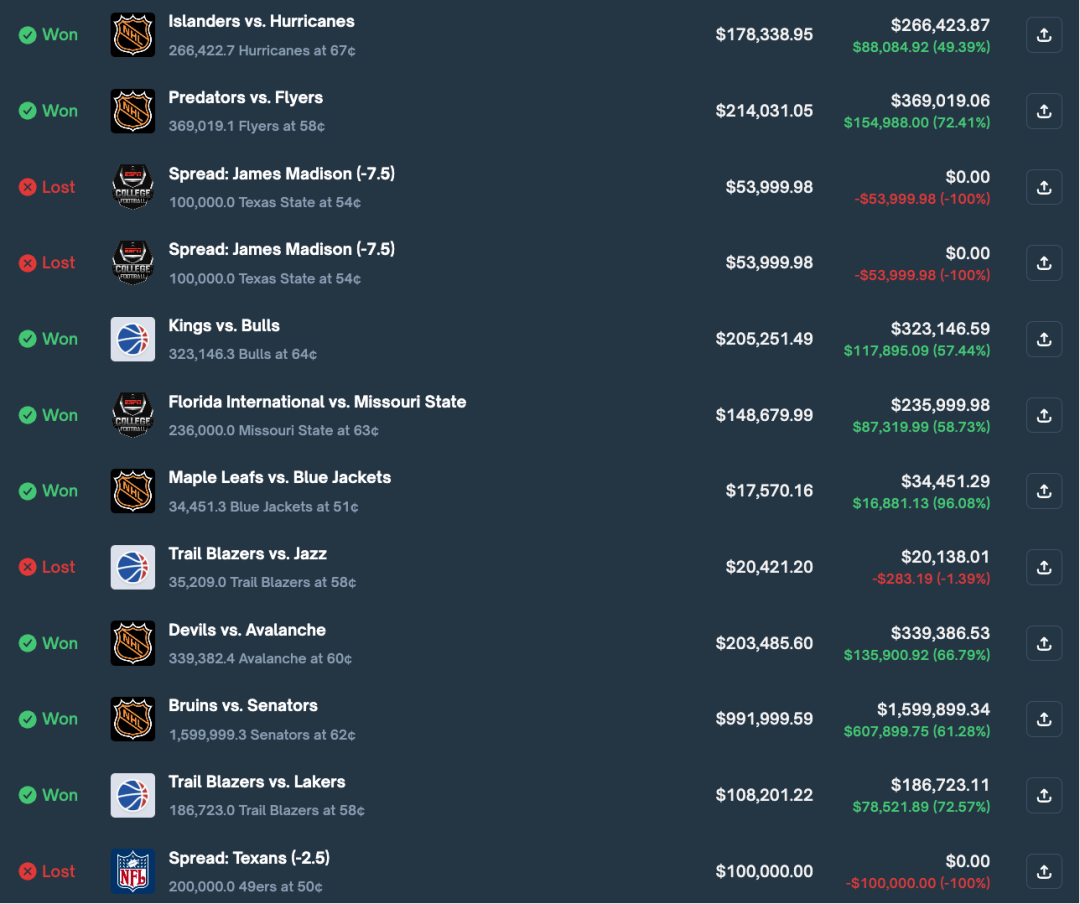
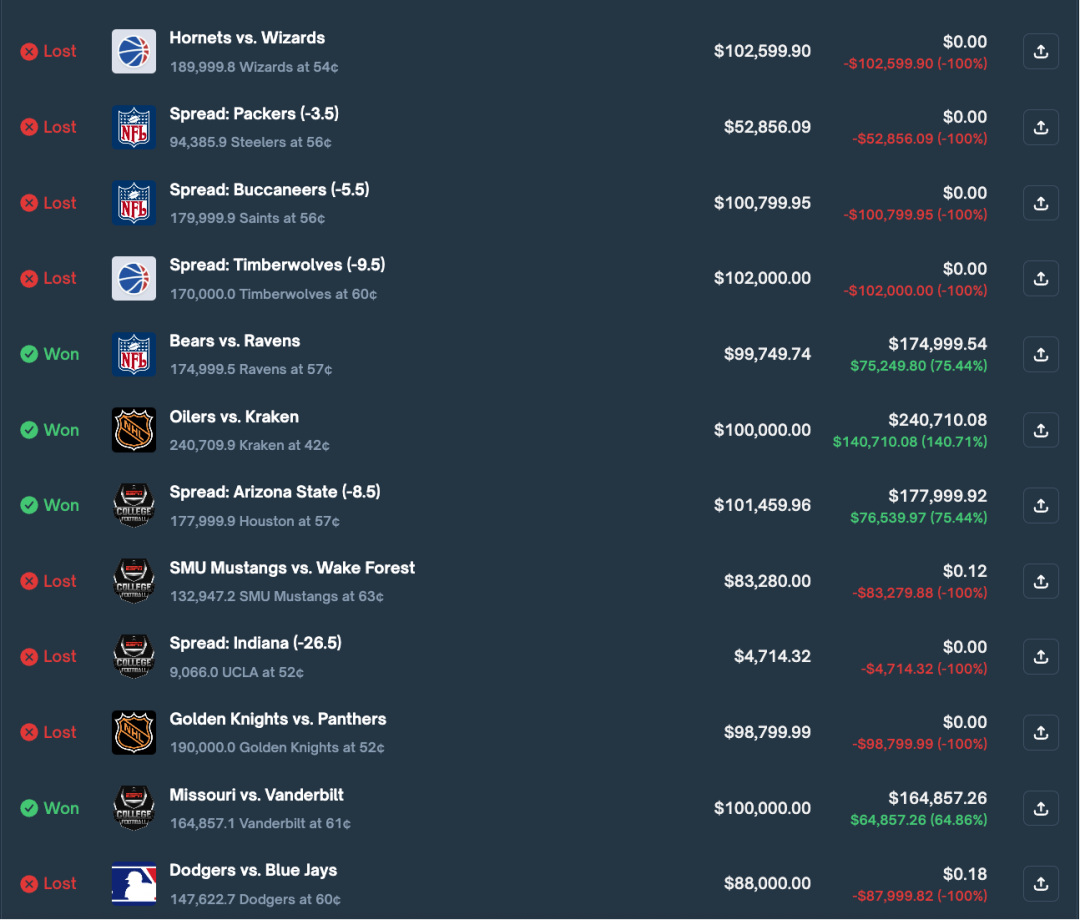
Mayuravarma's betting event result records (from bottom to top, time is from early to late)
In subsequent bets, Mayuravarma seemed to have found the trick to the prediction market again, returning to a "winning general" state: in 12 matches, he only lost 3, winning all the others. It was during this phase that he experienced his highlight moment:
In the CFB match between Houston and UCF, with a betting amount of $745,000, he ultimately achieved a profit of $687,200, with a profit rate of 92.25%, marking the largest profit in his account to date, ranking first among his 108 betting actions.
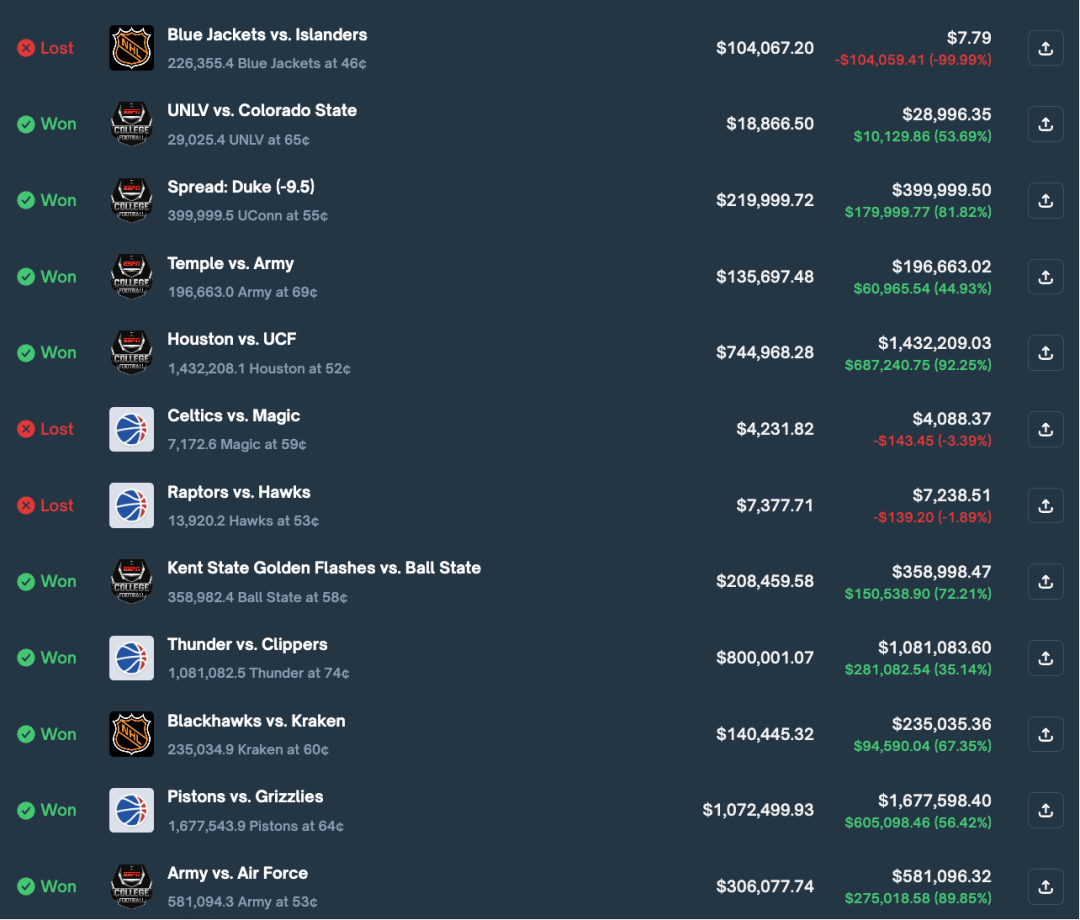
However, perhaps like the "correction after a new high" in the crypto market, after experiencing personal glory, Mayuravarma faced his darkest moment: in the next 10 matches (including the previous one, totaling 11 matches), it was as if his luck had run out, leading to a painful "10 consecutive losses," with cumulative losses reaching $2.05 million.
Most of the events in which Mayuravarma suffered losses during this phase (8 out of 11) were NHL hockey events, which have an upset rate of about 30%, the highest among the four major professional leagues in the U.S., far exceeding NBA, MLB, and NFL events. This may have also laid the groundwork for his eventual "one misstep leads to total defeat."
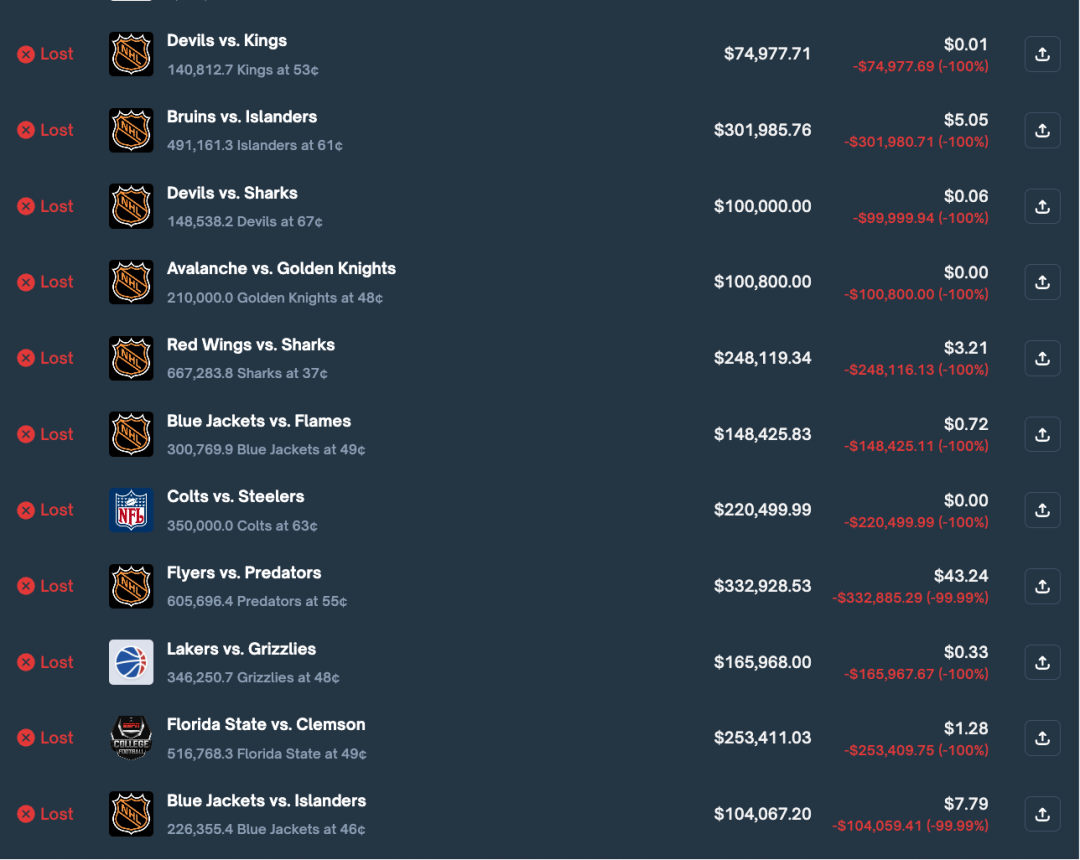
"The Tragedy of 11 Consecutive Losses"
How Gamblers Are Made: When Bettors Are No Longer Satisfied with Small Stakes
Perhaps just like fengdubiying, who made millions by only betting on LOL eSports events, after experiencing painful consecutive losses, LOL eSports also became Mayuravarma's "turning point."
After betting on "T1 winning the LOL S15 World Championship" and raking in a profit of $600,000, Mayuravarma found his "luck" again, and his overall performance finally broke free from the streak of bad luck, starting to see both wins and losses.
However, by this time, he may have already become accustomed to treating "money as mere numbers." His betting amounts were no longer limited to the previous $100,000 range but increased to $300,000 to $500,000, and he even dared to bet $1 million directly with a profit rate of around 30%.
When a trader known for his "steady and conservative, only betting on strong teams" style changes his previously cautious trading attitude, it is undeniable that he has been influenced, to some extent, by the complex market environment and the obsession with "just wanting to win." The outcome, of course, is evident.
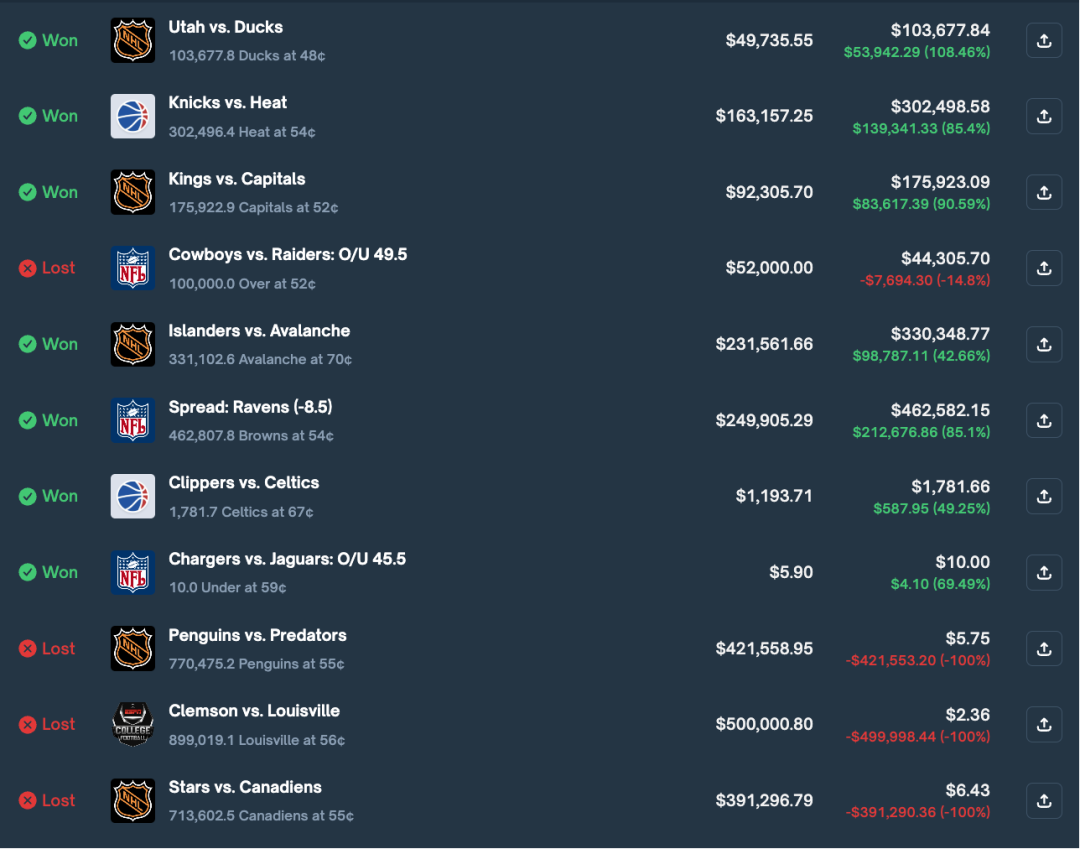

Trading Records (from bottom to top, in chronological order)
Rising to Glory in a Month, Falling from Grace in a Week: The End of Mayuravarma's "Dynasty"
On November 14, through about a month of rapid maneuvering, Mayuravarma's personal profit soared from an initial $7,000 to nearly $3.9 million.

Mayuravarma's Account Peak Profit Data
However, just a week later, Mayuravarma faced heavy losses in NHL and CFB matches, bringing his profits close to zero:
- In the CFB match between Texas State and Southern Miss, he bet $1.2 million on Southern Miss to win, ultimately losing all his capital;
- In the NHL match between the Capitals and Canadiens, he went ALL IN again, investing $1.2 million on the Canadiens, who had a higher pre-game win rate, but failed to cut losses in time, losing nearly $1.2 million, resulting in a personal profit-loss record dropping from profit to -$3.8 million within a week.
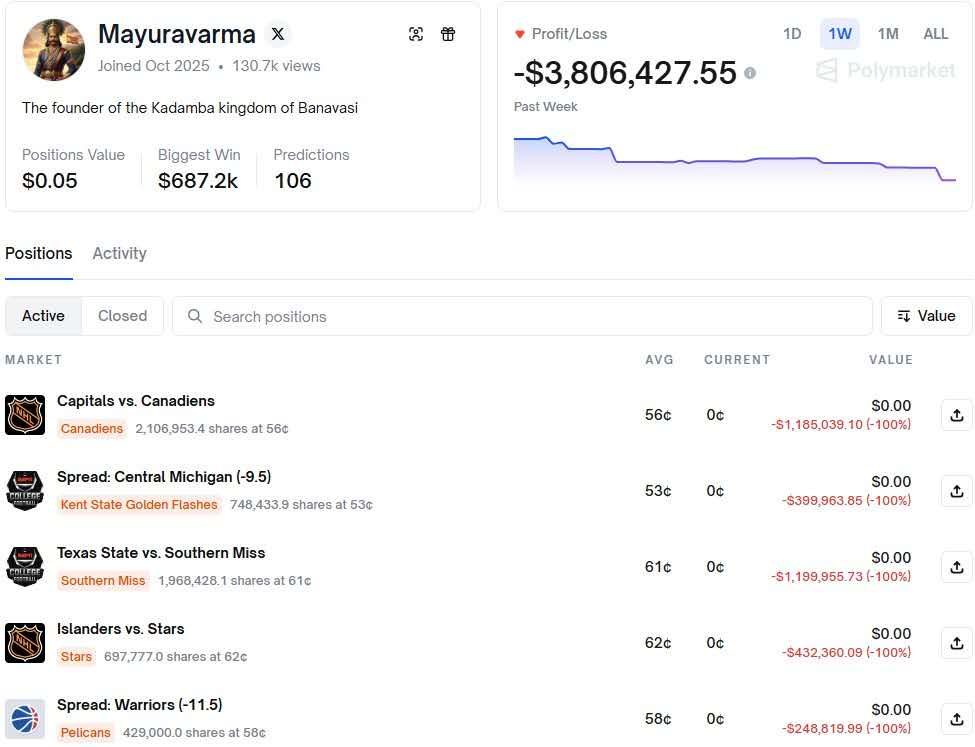
It was also on Saturday, November 22, after experiencing the rollercoaster of "gaining over $3.8 million only to give it back," that Mayuravarma deleted his account on the X platform in frustration.
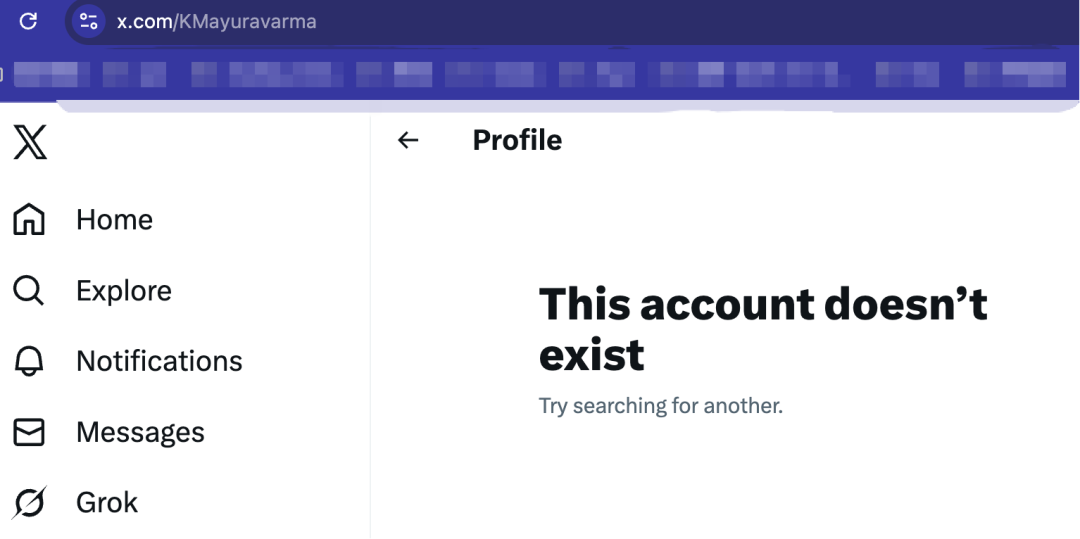
Subsequently, perhaps unwilling to become a laughingstock on Polymarket, Mayuravarma transferred another $1 million into his personal account and bet on various sports events again, but the final result was still more losses than wins.
As of the time of writing (November 26), Mayuravarma's personal account on Polymarket showed a cumulative loss of $885,000, with current holdings of about $278,500. This means he not only gave back all his previous betting profits but also lost hundreds of thousands of dollars of his own capital.

In a certain sense, in sports events where the outcome of team victories and defeats is at stake, the prediction market, where "one side wins and the other loses," is not much different from the contract market, where "it either goes up or down": in limited choices, the seemingly fewer options in the prediction market can be more brutal than the leveraged contract market. Many people find it difficult to cut losses in time when opening contracts, instead choosing to wait for the results to settle or hoping for an upset as the event nears its end. At that point, players lose not only their high hopes but also their hard-earned precious capital.
Under the automatic settlement mechanism at the end of events, the "winner takes all" nature of the prediction market appears even more ruthless.
Does ID Determine Fate? From fengdubiying to "The Creator of the Peacock Dynasty"
Perhaps the prediction market always carries a hint of mysticism— even the trader's ID seems like a mysterious spell, quietly influencing his profit and loss trajectory.
In Sanskrit, the prototype of Mayura is "मयूर" (Mayūra), meaning "peacock," which symbolizes holiness and beauty in Indian culture; Varma is a common surname in South Asia, derived from the Sanskrit "वर्मन्" (Varman), meaning "protector" or "armor," often associated with the noble or warrior class; additionally, the Varma suffix is commonly found in the noble surnames of Kerala, India, suggesting a protective role in the caste system.
Moreover, as mentioned in the personal homepage introduction of Mayuravarma on Polymarket, this ID has a certain connection to Mayurasharma, the founder of the Kadamba dynasty, which used the peacock as its symbol and ruled the area of present-day Karnataka, India. The latter's name implies "protection of the peacock." Inscriptions from South India record that his name reflects a combination of Kshatriya (warrior class) and nature worship.
Just like the "Peacock Dynasty," which has vanished into the annals of history, Mayuravarma is merely a fleeting "trading footnote" in the rapidly developing prediction market.
It is foreseeable that legendary stars who suddenly become wealthy like him are still gearing up in the betting market of Polymarket, while there are also many traders who, like him, have fallen from grace and lost all their assets. Like the "Brother Ma Ji" Huang Licheng, who repeatedly battles in the contract market despite failures, Mayuravarma is not the first, nor will he be the last.
免责声明:本文章仅代表作者个人观点,不代表本平台的立场和观点。本文章仅供信息分享,不构成对任何人的任何投资建议。用户与作者之间的任何争议,与本平台无关。如网页中刊载的文章或图片涉及侵权,请提供相关的权利证明和身份证明发送邮件到support@aicoin.com,本平台相关工作人员将会进行核查。




